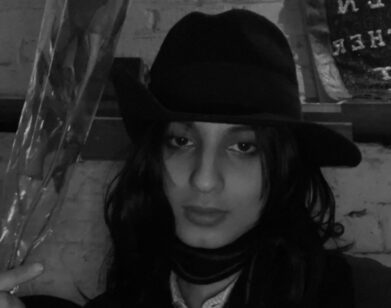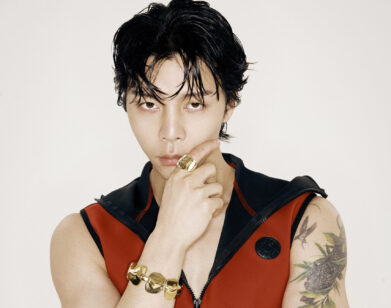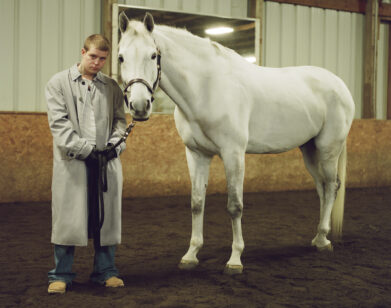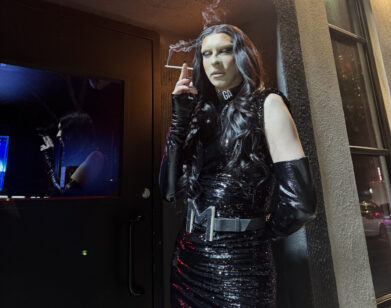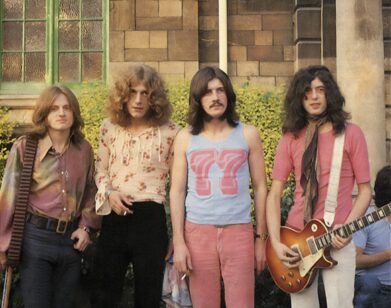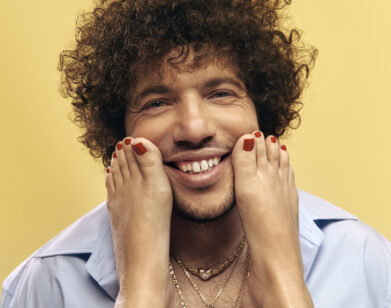Discovery: POSTAAL
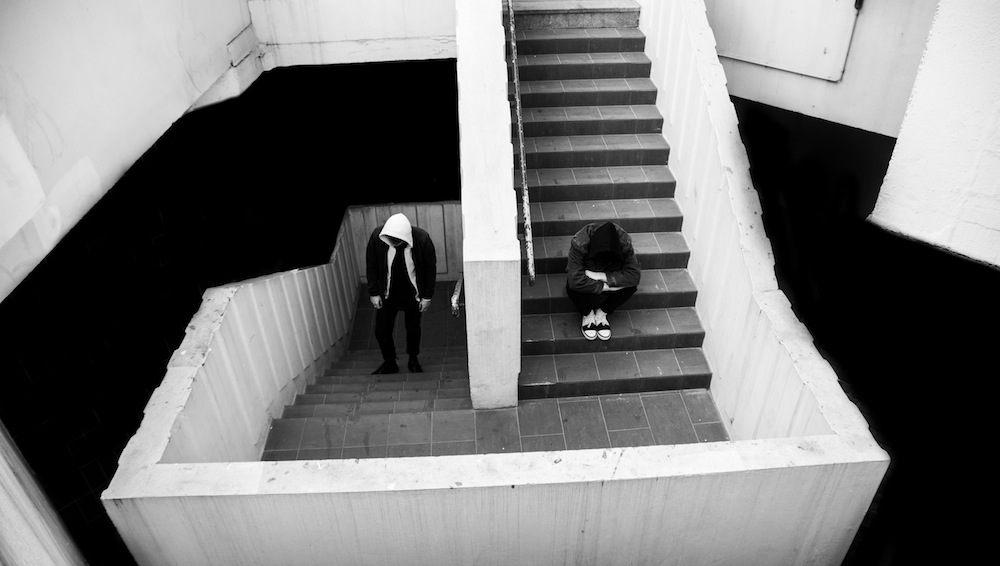
ABOVE: POSTAAL.
Little is known about the musical duo POSTAAL beyond their first names. The band consists of Dennis, a British singer, songwriter, and producer, and Hervé, a Frenchman of similar talents. They both live in Paris, where they first met two years ago. The mystery surrounding them is, perhaps, all by design; the pair makes electronic music that’ll get you dancing, surely, but more notably, they’re not afraid to write about subjects greater than the sum of themselves. This sentiment lends itself to their veiled personas: They put the message and the music first.
Their debut single “(Taking My) Freedom,” which they released last year, boasts original vocals in both English and French as well as an anthemic Jill Scott sample that proclaims, “I’m taking my freedom / Pulling it off the shelf / Putting it on my chain.” They followed that up with “City Lies,” a house-tinged, downtempo tune detailing the distress surrounding class disparity within Paris today. These tracks, and their debut EP AA1 (which they self-released in January), have cemented them as a must-see act on the European festival circuit. They’re rising to prominence alongside the likes of contemporaries Woodkid, The Shoes, and Brodinski, and with a debut LP on the horizon, won’t be stopping anytime soon. They’re currently touring their EP throughout Europe and this weekend, they will perform at Positivus Festival in Salacgriva, Latvia. Before they traveled to Latvia, Dennis spoke to us via Skype about perfecting their live shows, their forthcoming LP, and working in the City of Love.
NAMES: Dennis, Hervé
BASED: Paris, France
FIRST MEETING: A mutual friend of ours, a guy named Tristan—he’s quite a big producer in France—basically told me I should come to the studio. I had been living in Paris and had other projects, but not much to do for them. So he asked me to come to his studio, it’s like a little cave in the apartment, and I met Harvey and we started making music that night. We stayed up all night drinking beers, making tunes, and it was just easy, really comfortable. I don’t think I’ve ever worked with anybody where things clicked that easily. So yeah, we just carried on from there. We listened to the music the next day and thought, “Well actually, shit, this is quite good. We should carry on.” That was about two years ago. And it’s just sort of spiraled from there into being something we should take seriously and put our time into.
“FREEDOM”: We started working on the song “Freedom” about a week after that, which sort of gradually became what it is now. It gave us the sonic feel of how we should do stuff. We started originally working with samples a lot, because we couldn’t really do what we wanted to do with choruses at the beginning. But obviously sampling is a little more complicated legally, so we spent a lot of time needing to clear the Jill Scott sample. So now when we want that, we have singers that we tend to collaborate with.
SOCIAL SONGS: It’s interesting because I lived in London for a long time. I’m not from London; I’m from a small town in England. But yeah, it just kind of surprised me how much of it you could see, how much poverty there is, on the streets in Paris. In London it gets swept away, but [Paris] was a real eye-opener. I think with the migrant crisis, you kind of see there’s a lot of camps set up on little bridges here, and it just made me think. The whole concept [behind “City Lies”] is the city doesn’t lie, you see it as it is, whereas you don’t get that as much in London. It’s still pretty gritty. I tend to walk everywhere in Paris so you see a lot of stuff. I think it kind of represents how things are at the moment. It’s one of those kinds of cities.
PUTTING THE MESSAGE FIRST: The most important thing is the song. I think it’s good for stuff to sound exciting and production is important, but the basis of everything is songs. If you haven’t got a good song, you’re fucked.
EARLY INFLUENCES: When I was a kid, I grew up listening to a lot of Chemical Brothers, obviously a lot of the Beatles, the Velvet Underground, and more song-based stuff. I remember the Chemical Brothers really opened my mind to something else, another kind of genre, another way of looking at stuff.
679 HOLLOWAY: I used to work at a record shop in London. It was the home of a label called 679 Artists at 679 Holloway Road. A lot of [musicians] who have done very well have worked at that record shop. There’s a guy named Dan Avery, who’s a DJ/producer, and a guy named Gold Panda. It’s a really good scene. But it’s closed down now, like many great record stores. There wasn’t enough business, which is really sad. It was a bit of a High Fidelity vibe—you get a little twisted and bitter.
THE PARIS SCENE: [Making music here] is less chaotic. I think people take their time more in France; they make sure it’s better quality before they run with stuff. In London, people are doing gigs before they’ve written even five songs. And there’s a lot of hustle in London and there’s a lot of bands, a lot of people doing that. I also find that the quality of the production in France is better; people just think about it a bit more. Hervé, technically, is really better than any producer I’ve worked with in England and really knows how to get that sound, the electronic sound, and get it sounding good. It’s different. There’s not as much music in France, there’s not as many artists that cut through, but for me, it was an interesting concept. I find it a much more relaxing place to make music.
KANYE ON THE WAY: We’re going to do another single at the end of the summer and we’re recording the album at the moment. We’re actually quite far into it, we should finish it in July, I imagine. But I guess [it will be released] when the time feels right. Probably not until next year. But obviously [we’ll release] another single and see where we get. We’ve started working with a producer in L.A. who’s worked with Kanye West and on some really big things, which is quite exciting. We’ve done one track so far. When he got in touch we were like, “Really? Shit!'”
AT HOME IN THE STUDIO: We tend to work long hours until we get stuff done. We’ve got a room in this place called Studio Pigalle, which is one of the oldest studios in Paris. It’s really beautiful, and we’ve basically got a small room there, which is great because when they’re not using the big room, we can steal some of the equipment and they’ve got amazing microphones. It’s a really great place to be.
WORK IN PROGRESS: Every time we do a gig we try to up it the next time around. We’re just trying to improve the live show. We do quite a big thing with lighting and digitals, and it’s quite complex. It was a bit risky for a while, so we’re just trying to make it more stable and better organized. It’s exciting. We ordered these lights from China, which were kind of… It was a bit risky. Everything is in sync [now]. We have these big LED bars that go on the front of the stage with the two As. And we use visuals when we can use visuals, as well, which is all synced in. But you know, the live show is kind of all coming together. It’s probably a little more uptempo than you might have heard. It’s a bit more of a party live.
AA1 IS OUT NOW. FOR MORE INFORMATION ON POSTAAL, VISIT THEIR FACEBOOK.

